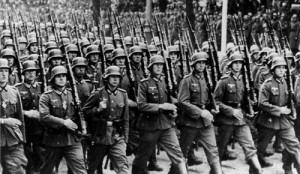The Wars of Germany
German Soldiers Marching During World War Two
The nation of Germany has a long history of unity and separation. Various empires and confederations rose and fell throughout German history, often replaced by smaller kingdoms, principalities, and nations that would eventually re-unify to form a new version of Germany. This page looks at the German wars and conflicts since the birth of the “modern” Germany after the Franco-Prussian War (or French-German War) of 1870-1871. This conflict brought several independent German states and kingdoms together to form the German Empire. This new European empire acquired colonies in Africa, Asia, and the Pacific, resulting in several colonial wars in the late 1800s and early 1900s. That empire later fought and lost World War One, resulting in Germany losing its colonies, as well as large sections of its homeland and setting the stage for revolutions, economic collapse, and the rise of Hitler.
After losing World War Two, Germany once again found itself split apart, this time into two new nations, popularly called West Germany and East Germany. The two Germanys faced off against each other as part of the world-wide Cold War. After the Communist regimes in Eastern Europe and Russia fell, and the Cold War ended, the two Germanys re-united into the latest version of a unified nation. In the early 21st Century, Germany now finds itself a wealthy, democratic member of the NATO alliance; and as a member of NATO, German troops once again face combat in the anti-Taliban war in Afghanistan.
Franco-Prussian War (July 19, 1870 – May 10, 1871)–Major war between the Prussian-led German forces and the Second French Empire. This war helped cause the unification of Germany and paved the way for the ongoing hostility which was a leading cause of World War One.
Arab Rising in East Africa (1888-1890)–Unsuccessful native uprising against German colonial policies and German rule.
Wahehe War in East Africa (1891-1893)–Unsuccessful native uprising against German colonial policies and German rule.
Samoan Civil War (1887-1889)–German involvement in Samoan Civil conflicts as a part of the growth of the German Empire into the Pacific.
Samoan Civil War (1893-1894)–German involvement in Samoan Civil conflicts as a part of the growth of the German Empire into the Pacific.
Boxer Rebellion/China Expedition (1900)–Germany joined ten other nations in sending military forces to fight the Chinese government as well as anti-Western Chinese rebels.
Hottentot Uprising in South West Africa (1903)–Uprising against German colonial policies and German rule.
Insurrection in Cameroon (1904-1905)–Uprising against German colonial policies and German rule.
Maji Maji Uprising in East Africa (1905)–Uprising against German colonial policies and German rule.
World War I (1914-1918)
Kiel Mutiny (1918)–Mutiny by Navy sailors. This event sparked the German Revolution.
German Revolution (1918-1919)–Overthrow of the German monarchy. This revolution effectively caused Germany to surrender to the Allies and ended World War One.
Bavarian Revolution (Nov. 7, 1918-May 1, 1919)–Commuist revolt suppressed by the government and the Freikorps militias.
Spartacist Revolt (Jan. 6-Jan. 15, 1919)–Commuist revolt suppressed by the government and the Freikorps militias.
Kapp Putsch (March, 1920)–Failed military coup against the German government.
Upper Silesia (Polish) Rebellion (1921)–German and Polish militias fight prior to a vote on which nation gets the coal-rich region of Silesia.
French and Belgian Occupation of the Ruhr Valley (Jan. 11, 1923-August, 1925)–Germany fell behind in war payments to the Allies due to the collapse of the German economy. France and Belgium invade and occupy the industrial Ruhr Valley region of western Germany until the re-payments are complete.
Hitler’s Beer Hall Putsch (Nov. 8-11, 1923)–War veteran and political agitator, Adolf Hitler led his Nazi Party in an attempted overthrow of the Bavarian government. The police crushed his uprising, and Hitler was sentenced to prison.
Spanish Civil War (1936-1939)–Nazi Germany and Fascist Italy send troops and air power to help Fascist Spanish rebel Francisco Franco defeat Spanish Republican forces.
German Annexation of Austria (March 12-13, 1938)–Germany invades and annexes Austria.
German Annexation of the Sudetenland (1938)–Hitler threatened to invade Czechoslovakia in order to gain control of the German-speaking Sudeten border region. Britain and France allow Hitler to seize the Sudetenland.
German Annexation of Bohemia and Moravia (March 10-16, 1939)–Hitler completes his takeover of defenseless Czechoslovakia. The eastern part of the nation became an “independent” satellite of Germany called Slovakia.
World War II (1939-1945)–The European portion of World War II officially begins on Sept. 1, 1939 with the German invasion of Poland. The European war ended in May, 1945 with the complete defeat and occupation of Germany by the Allies. Germany was eventually split into the democratic West Germany and the Communist East Germany until the East German collapse in 1989 and the re-unification of Germany in October, 1990.
East German Uprising of 1953—East Germans revolt against Soviet control. The uprising is crushed by the Soviets.
Warsaw Pact Invasion of Czechoslovakia (1968)–East German forces particpated in the Soviet-led invasion of Czechoslovakia.
Kosovo War (1999)–German air power participated int the Kosovo War against Serbia (Yugoslavia), as a part of the NATO Alliance.
The War on Terror (2001-Present)
The War in Afghanistan (2001-Present)–German forces currently take part in allied operations in Afghanistan as a part of NATO.
News about Germany’s War in Afghanistan:
German Limits on War Facing Afghan Reality—New York Times, Oct. 26, 2009
SOURCES:
1. Kohn, George C. Dictionary of Wars. New York: Facts On File Publications, 1986.
3. Langer, William L., ed. An Encyclopedia of World History. 5th ed. Boston, Massachusetts: Houghton Mifflin, 1972.
4. Banks, Arthur S., ed. Political Handbook of the World: 1994-1995. 5th ed. Binghamton, NY: CSA Publications, 1995.
5. Internal Wars and Failures of Governance, 1954-1996–-By the State Failure Project.


Comments are closed, but trackbacks and pingbacks are open.